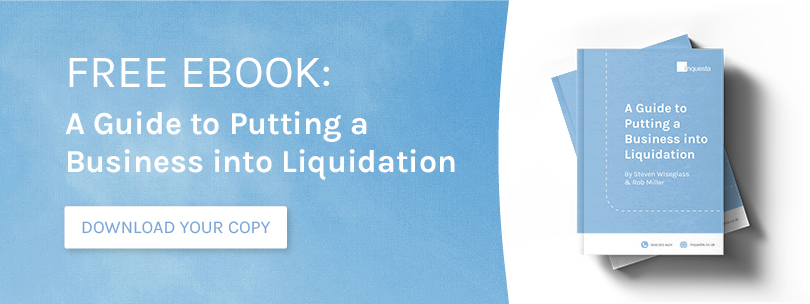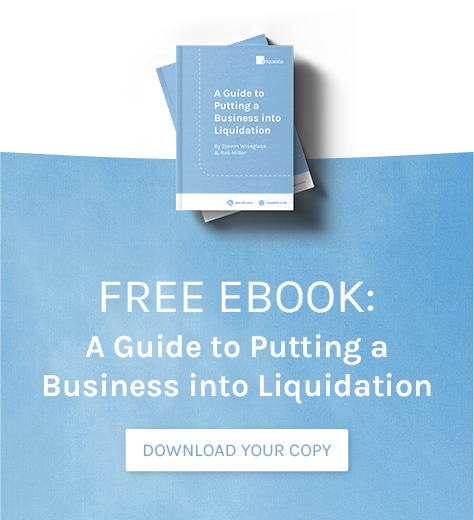If you are the director of a limited company that cannot pay VAT, it is important that you understand the situation you are in — what you should do first, and what options are open to you.
Failure to treat the situation with the seriousness it requires could quickly lead your business to be considered insolvent and wound up, leaving you without a company, and your employees without a job.
What is Value Added Tax?
Value added tax (VAT) is a form of consumption tax, charged exclusively on goods and services rendered. VAT can be levied at all stages of the supply chain; from production through to the final sale.
Any company with a turnover above £85,000 is legally required to register for VAT. A VAT-registered business is obligated to charge VAT on top of all sales, while being able to reclaim VAT on anything purchased for the business.
| % VAT | Applicable to |
|---|---|
| 0% | Zero-rated goods (childrens clothes, books, prescription medication etc.) |
| 5% | Applicable goods and services (power bill, childrens car seats) |
| 20% | Majority of all goods and services sold |
Some services and goods are exempt from VAT due to a belief that they are necessary to the country. Each country will have a different list. In the UK, these include:
- Charity fund-raising
- Stamps
- Education
- Sports activities
- Commercial property
- Some medical procedures
- Insurance
VAT must be paid to HMRC every three months. Failure to do so can result in sanctions against your company.
What Happens if You Can’t Afford to Pay VAT?
It is mandatory that all applicable businesses file their VAT returns on time each quarter, no later than seven days following the end of your VAT period. No allowances are made for late payment, so you must contact HMRC as soon as possible. Failure to do so can result in financial penalties, or ultimately, even the insolvency of your business.
There are various possible penalties for a limited company that cannot pay VAT, these can include:
Financial Penalty
A business that fails to pay their VAT on time for the first time will not face a financial penalty. They will instead be issued with a surcharge liability notice which ensures that, from this point on, any late payments will result in a penalty charge. This option should be avoided at all costs if your business is struggling, as the last thing a business facing difficulties wants is for costs to increase.
Insolvency
Failure to submit a return, as well as a failure to report financial difficulty to HMRC in advance, will put HMRC in the position where it feels it needs to take action. They may well assume the company is facing serious financial issues and is likely insolvent.
This will result in HMRC acting to prevent any future tax liabilities. They will do this by initially sending a distraint order letter to demand the immediate payment of all tax owed. Further failure to comply will likely result in them seeking to petition to wind up the company. If you have not done so already, it is at this stage that you should urgently contact a licensed insolvency practitioner for advice.
What to Do if You Can’t Pay Your VAT
Inability to pay your VAT doesn’t necessarily lead to the end of your company. If handled correctly, a director can turn finances around and correct the course of the business. To do so it is vital that you assess your situation, remain honest and open with HMRC, and ensure you understand your options.
Discover the Root Cause
A business being unable to pay their VAT is usually a sign of deeper issues within the company. If you cannot pay your value added tax the first thing you should do is take a step back — assess your situation, look at your financial figures and try to identify a point where things began to turn.

Potential reasons a limited company cannot pay VAT could include:
Contact HMRC
The most important thing when your limited company cannot pay VAT is to contact HMRC as soon as possible. Be honest and open with them, as HMRC may be willing to negotiate new payment terms with you.
Be aware that when speaking to HMRC, there are typically a few things they will ask of you, these often include:
- Your VAT reference number
- Company finance figures and documentation
- Accurate figures regarding business debt
- Evidence that you are attempting to correct your situation
Before contacting HMRC, it may be worthwhile to approach an independent specialist beforehand to assess your situation and ensure that you are prepared for whatever questions HMRC may have.
Understand Your Options

When it is found that a limited company can’t pay their VAT, there are only a few courses of action open, and even fewer that will benefit each party. The main options are:
- Time to Pay: A formal agreement between a struggling business and HMRC that grants up to 12 months to repay outstanding tax debt.
- Business Funding: If struggling to pay debts, it may be possible to find a new form of funding for the business.
- Company Voluntary Arrangement: A method for companies facing financial difficulties to form an agreement with creditors to satisfy debt obligations, while offering protection from legal action.
- Liquidation: The process of shutting down a limited company, with recovered assets being used to pay off any debts.
Not all circumstances are the same when it comes to unpaid VAT so it is important that you seek specialist assistance to go through the available options and help guide you towards the best one for your company.
Are Directors Personally Liable for VAT?
Generally, company directors will not be personally liable for an inability to pay VAT. However, should the failure to pay be considered a deliberate action, or the company is deemed to be insolvent then directors may be found to be liable and forced to pay off accrued debts with personal assets.
If an owner is found to be personally liable for failure to pay VAT, it is possible that HMRC will seek to demand security for any future or current businesses the director may be involved in. This will be done by seeking a sum of money up-front.
How Inquesta Can Help With VAT Arrears
With decades of experience providing expert tax debt solutions to companies in all manner of industries, Inquesta is perfectly placed to help if your limited company cannot pay VAT.
We know the complications that can arise when dealing with HMRC arrears, and we appreciate the stress you are likely to be under as a result — when the future of your company is threatened it is important that you get it right.
Experienced with dealing with HMRC, we can assess your situation and advise you on the best course of action for the sustained future of your company, or we can even approach HMRC directly on your behalf to ensure the best outcome possible.
For additional information on what Inquesta’s team of tax debt experts can do to help you, contact a member of our team today or request a no-obligation consultation.




